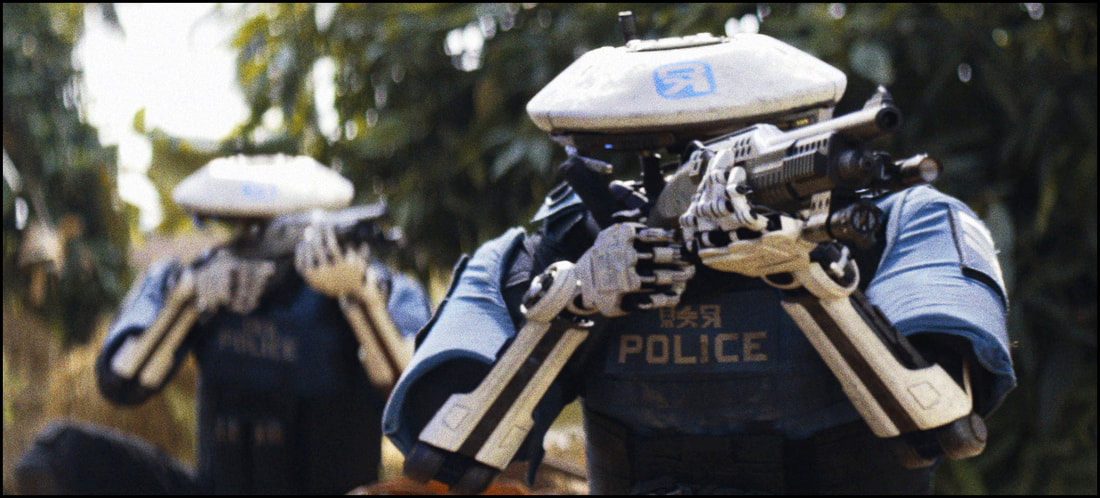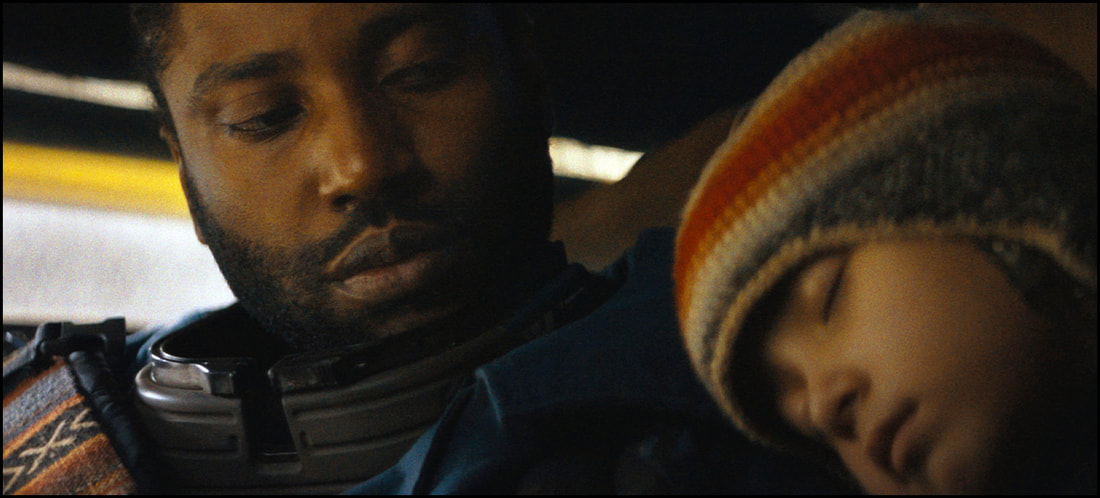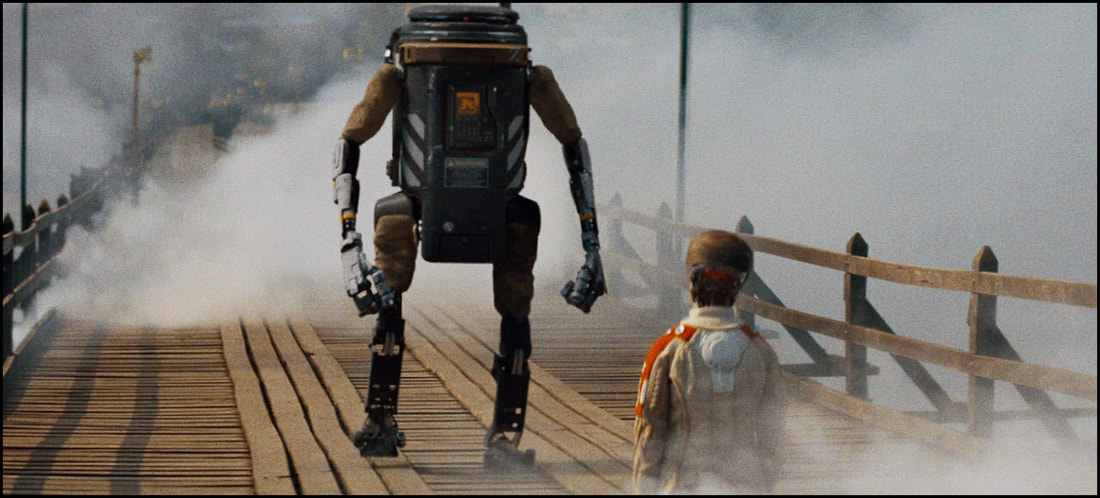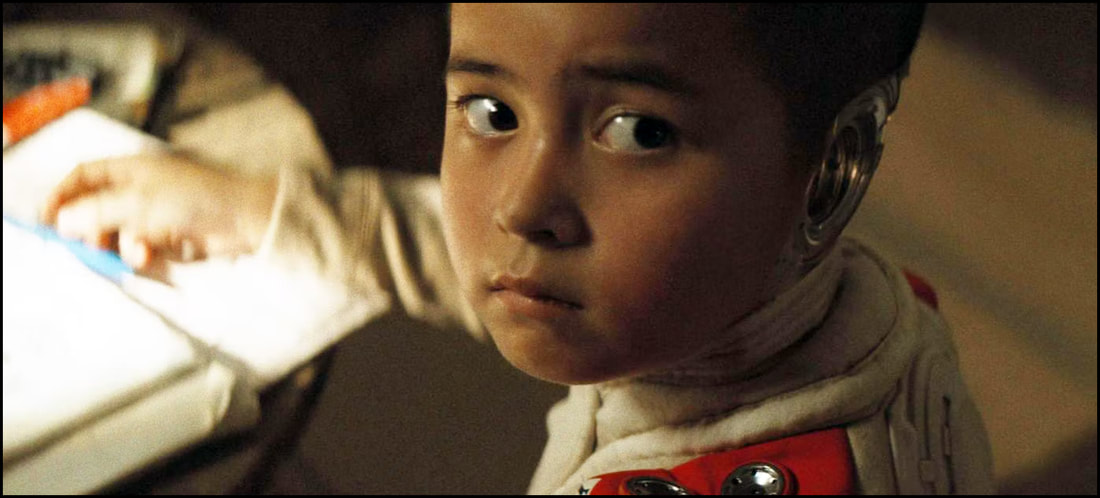In fairness, some of the resulting excitement could be attributed to the fact that – as of late – many of fandom’s biggest intellectual properties have been seen as underperforming by a very large percentage of the audience. Star Wars – even its TV iterations – have kinda/sorta disappeared from the horizon, and – even though I’ve never been a big Marvel guy – the Mouse House’s explorations of All Things Spandex have stalled in terms of popularity and casual interest. (Do NOT get me started on the DC lineup!) Add to the equation that the recently-ended writers strike and the ongoing actors strike has ground the news cycle to a halt and maybe – just maybe – that whole “it’s never been a better time to be a fan” sensibility reminds us that, indeed, there has been a better time to be a fan … and it isn’t now. As you might guess, The Creator was perhaps anticipated by many as being able to fill a gaping chasm left in the entertainment landscape. It’s not uncommon for fans to embrace new ideas this way.
Well …
Sadly, The Creator opened to rather dismal box office numbers – I think it placed third in its first weekend on screens – and it’s resounding failed to ignite fires anywhere that I roam to gauge the heat. I have read a good deal on commentary about it being a somewhat ‘failed masterpiece,’ and – having seen it this past weekend – I’m not even sure I’d agree with that assessment. Frankly, I found it all a bit confusing, a surprising twist given the fact that I loved what writer/director Gareth Edwards did with Monsters (2010) and even more with Rogue One (2016). Perhaps trying to do too much with too little (story and money) truly cursed this outing to cultural obscurity, and maybe it’ll take some time to see if it can emerge as a bona fide cult classic if found and explored in the months and years ahead.
Still … I’m inclined to say “no,” and those who really want to know the particulars are advised to stay tuned.
(NOTE: The following review will contain minor spoilers necessary solely for the discussion of plot and/or characters. If you’re the type of reader who prefers a review entirely spoiler-free, then I’d encourage you to skip down to the last few paragraphs for the final assessment. If, however, you’re accepting of a few modest hints at ‘things to come,’ then read on …)
“Against the backdrop of a war between humans and robots with artificial intelligence, a former soldier finds the secret weapon, a robot in the form of a young child.”
Generally speaking, I think Science Fiction and Fantasy fans have long tolerated a bit of politics with their storytelling.
The truth is that this genre has always been at the forefront of presenting some of society’s most constructive criticism, be it conversations about how utopia is attainable or even what First Contact by an intelligent species other than our own (snicker snicker) might look like. Yes, we’ve examined the hard science of defense, teleportation, and space travel; and we’ve been willing to hold them up in even critical light, asking what it could mean for not our own but subsequent generations and how their world could be negatively impacted by all of it. Perhaps more than any other genre, ours begins with a concept that could court controversy right out of the gate; so fans have been accustomed to setting aside their differences if for no other purpose than to be entertained.
And specifically, writer/director Gareth Edwards has tackled some political ideas in his quest to deliver some inspired pictures to the silver screen. Monsters (2010) used the backdrop of third world countries to take a look at how our entire planet might deal with an alien invasion of a different sort. Godzilla (2014) – by its very nature – loosely introduces the dangers of nuclear power and what it might unintentionally unleash on the world-at-large. Rogue One (2016) took a close look at the galaxy far, far away via its own military-industrial complex; and the creation of a planet-destroying space station showed audiences what unchecked military power can achieve when no one’s watching the watchers.
However, the politicization of these stories was extremely light. If anything, the resulting politics and/or political discussions were little more than an undercurrent – something that could be felt or even completely missed by the more casual viewers. Folks watching closely – critics, academics, etc. – could choose to make more of these elements were they so inclined, but Edwards never let them get in the way of weaving a good story – first and foremost.
Alas, a bit of nuance could’ve been used with The Creator as even its name – with its Biblical overtones – bit down and never let go.
Joshua (played by John David Washington) is a soldier whose specialty appears to be infiltration of terrorist groups. In the opening sequence, he’s been tasked with a deep cover assignment into enemy territory and has managed to align himself with a group of machine/human hybrids defending artificial intelligence from annihilation. He’s fallen in love with Maya (Gemma Chan), a cyborg who’s now pregnant with his child, and they’re smitten with the idea of spending forever together. But an unanticipated military assault brings their wedded bliss to an end with Maya seemingly killed in the exchange and Joshua recalled to the States.
Edwards has crafted his war story with a few noticeable downsides.
First off, he’s written a yarn that’s wildly anti-American if not specifically anti-Western Civilization. From the film’s opening scenes, it’s very clear that the good ol’ United States of America – that Bastian of democracy that has saved the world from global conflicts at least twice – is clearly “on the wrong side of history” by having not only declared war on Artificial Intelligence but has fabricated evidence seemingly to convince whatever countries remain to join forces against the machines. Throughout the picture, Edwards has imbued only persons of color and/or persons of non-White heritage as being the good guys, even going so far as to enlist laudable actress Allison Janey in her most masculine role yet. She and her compatriots have no moral compass whatsoever, and they’ll maim, kill, and obliterate anything and anyone that gets in the way of achieving whatever U.S. interests are on the list.
Second, Edwards has kinda/sorta turned the world of tomorrow on its head compared to damn near anything in Science Fiction that’s come before. Namely, he’s asserted that Artificial Intelligence is the savior of our world, and he’s penned his script in such a way as to give only those characters augmented with such technology as being truly good, noble, and righteous. This, of course, flies in the face of damn near any reasoned argument that’s been made in the last ten years – why, even Edwards’ own industry has declared war on A.I. in the recent writers and actors strikes. Hasn’t the public forum been replete with some of our best and brightest warning us about the dangers of embracing this level of technology? Certainly, the Terminator and Skynet would be blushing over Edwards’ willingness to fall in love with such an idea.
Lastly, for reasons unknown Edwards seems to be operating from a frame of mind that the U.S. has legal rights to engage in open warfare in any country around the globe, and such a concept is astoundingly misinformed. Apparently, the writer has missed a whole slew of political thrillers that show the lengths to which America has to go just to get a single small squad of soldiers into any active arena outside of its own territories; so the fact that the Army of the Future would both have and maintain active fighting arsenals in each of the locales defies logic. Yes, I realize this is (A) fiction and (B) the future; but I can’t even begin to imagine any nation would surrender its sovereignty so easily given the fact that there never appears to be any authentic R-I-S-K from A.I. in this film. They’re essentially outcasts – the lowest of the low – so the fact that they pose any danger in any of this is almost laughable.
But the script’s problems aren’t all tied to the director’s political opinions.
If one sets aside the obvious politicization, then all we’re left with are the performances.
Sigh.
Washington – as much as he tries – evokes very little emotion in any of this. His best moments are those involving Maya, as he makes no real connection to Alphie until fairly late in the picture. Chan did fabulous work aboard the AMC series Humans – this is not her first rodeo as it pertains to playing synthetic people – but she’s wasted here, seemingly cast more as robotic eye candy than anything resembling an A.I. with the ability to feel real pain and grow real relationships. The young Voyles does a better-than-average job handling the precocious kid duties here, and – honestly – I think she deserved a better script, one that might’ve paired her up with adults capable of sharing the screen with this fledgling actress who might have a bright future. It’s so hard to tell, mostly because so much of this just felt empty to me.
The Creator (2023) was produced by 20th Century Studios, New Regency Productions, and Entertainment One. The film is presently screening around the world theatrically. As for the technical specifications? An awful lot has been written about the film’s extremely affordable budget, especially as it pertains to its pretty vast reliance on special effects. In that respect, yes, The Creator is very impressive. Stylistically? Again, I’ll avoid nitpicking, but I will add it didn’t feel all that epic in a few spots. As for the special features? As I watched this one on the silver screen, there were no special features under consideration.
Recommended, but …
Don’t be confused, folks: I struggled with a great deal of The Creator (2023) when it comes to its world building, its character definitions, and its rather obvious (if not shamefully so) politics; and yet it’s still a flick that’s worth seeing. The performances work reasonably well for the story as crafted, and the effects work is mostly very good quality. I tried to be very clear above on what I felt were some narrative drawbacks, and I’d be remiss to take another visit to this dark tomorrow even if a sequel were possible. It just wasn’t all that interesting on the fundamental levels, making it a miss so far as this old school SciFi junkie is concerned.
-- EZ





 RSS Feed
RSS Feed